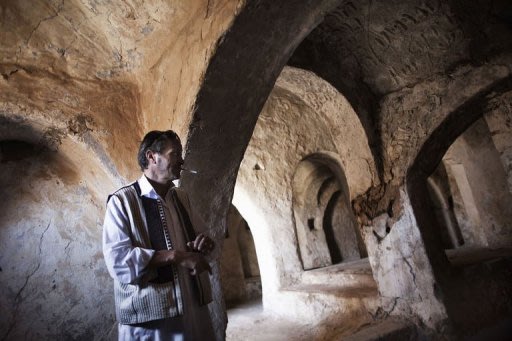 Omar Aboud, a Berber, stands inside one of Yafran's abandoned synagogues
Omar Aboud, a Berber, stands inside one of Yafran's abandoned synagoguesNo Jews have lived in the Berber areas of Libya since 1950, but the news agency AFP has just discovered the shared, repressed history of Berbers and Jews. Berbers have campaigned to preserve Jewish buildings, and a pair of Berber twins even amassed documentary evidence of Jewish history until the regime confiscated their collection: (with thanks: Eliyahu)
For centuries, Jews lived among the Berbers of Yafran, observing the Sabbath at the synagogue of Ghriba, but they suddenly left 63 years ago, and their land in Libya remains untouched.
Every hamlet around Yafran bears the mark of the Libyan Jews, who arrived in the country 2,300 years ago and, until their departure soon after Israel's creation in 1948, constituted half the city's population.
Everywhere, the ruins of their homes still cling to the mountainside. Some were lived in, others subsumed by the Berber population. Time has taken its toll, but the houses remain untouched and uninhabited.
"It's just as it was before," says Tarek Ayad, a 58-year-old retiree.
Numerous abandoned synagogues remain intact, silent witnesses to the co-existence of the two peoples. Amid the coloured mosaics of Ghriba synagogue, Hebrew inscriptions overlap those in Amazigh, the language of the Berbers.
Moulded Stars of David have been unharmed in one synagogue, despite it having been converted to a mosque after the Arab conquest of the 7th century, while the Jewish cemetery, with its many ancient tombs -- some of which are dug into the rock -- borders a Berber graveyard.
Some in Yafran remember the names of prominent Jewish families: Aaron, Mguelish, Guetta. For generations, fathers and sons alike were rabbis.
Others recall how the Jews were mainly traders, and how they shared common rituals with the Berbers, some of whom even converted to Judaism.
Today, however, there are no witnesses left of this bygone era. The last Jews left in 1950, and those old enough to remember that exodus left when the fighting started.
"All I know is that we used to live together and that there were no problems. My father told me they were good people," says Ahmed Siguk, an 46-year-old engineer.
Although more than 100 Jews died in Libyan pogroms in 1945, they are still considered to be part of the city, despite decades of anti-semitic propaganda since World War II.
"They are part of our population, they have lived here a long time. They are from this land, and spoke Amazigh," Ayad says.
A pair of twins are passionate about this history.
Researching their Berber background -- itself a tale of repression under Moamer Kadhafi -- they found the story of the Jews to be remarkably similar to their own, so close were lives of the two communities.
For 10 years, they secretly recorded witness testimony, archived marriage certificates and land deeds, and took photographs.
Yet nothing remains of this historical material, which was all confiscated in December last year when the twins were arrested for Berber activism and accused of spying for Israel.
But they remember a little of what the elders told them about their day-to-day life together.
"An old man told me that on holidays, Berber children would go to the synagogue in Ghriba, where they would sometimes listen to readings from the Jewish holy books," says 29-year-old Madghis Buzukhar. But one day in 1948, the Jews left. Read the rest here!

No comments:
Post a Comment